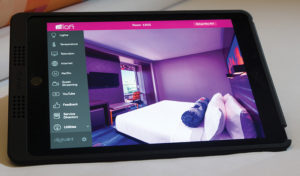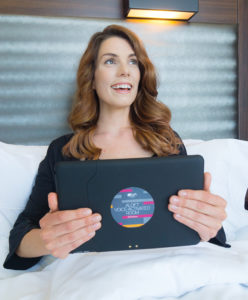STAMFORD, CT—The voice-activated hotel room is no longer a pipe dream for hoteliers seeking out cutting-edge technology for the in-room experience.
Recently taking a shot at turning voice-activated guestrooms into reality is Aloft Hotels, a brand owned by Starwood Hotels & Resorts Worldwide.
Following the results of “Project: Jetson,” the internal codename for Aloft’s voice-activated guestroom initiative, the brand’s vision attempts to present forward-thinking technology to its guests without hindering the simplicity of their stay.
Each room designated to have this technology is equipped with an iPad running an Aloft app, designed by DigiValet, which enables guests to control room temperature, lighting options and more from the device itself or through “Hey Siri.” The app also allows guests to check the weather forecast before exploring any local attractions.
A personalized welcome screen on the television instructs arriving guests on how to use various aspects of their voice-activated room. A tutorial guide on the iPad itself walks them through the setup process and answers remaining questions guests may have.
If guests choose to use the voice-activated functionality, they’ll have to go through a 10-second training session with Siri in order for it to recognize speech and create a voice profile. A single guest can activate the “Hey Siri” functionality. Additional guests staying in the same room can access Siri by pressing the home button on the iPad.
For soft-spoken guests, activating a command from afar shouldn’t be an issue, as long as the volume on the iPad is up. “We’ve tested it throughout different areas of the room, being in the bathroom, being on the other side of the room, and we really haven’t run into any issues with volume control,” said Eric Marlo, global brand manager at Aloft.
Aloft Boston Seaport and Aloft Santa Clara have already implemented the voice-activated hotel room. Each location has 10 rooms prepared with this technology. Currently, this project is in pilot stage, which may or may not last until the end of this year. (Generally, for Starwood, pilots last approximately three to six months.)
Not executed correctly, technology can add complexity to a guest’s stay, becoming somewhat of an empty promise. “I salute Starwood for trying to raise the bar, and it is only a first effort, but right now, it appears to be more of a novelty than a leap forward,” said Robert Cole, a hospitality technology consultant and founder of Rock Cheetah.
Rolling out too much, too fast isn’t always an effective approach when attempting to pair technological advances with the ever-changing in-room experience. Sometimes, less is more, especially with technology. “I think, right now, because we’re in pilot mode, we don’t want to overwhelm the guests, and that’s something that’s very important. This is something that’s brand new. It’s never been done before,” Marlo said.
What’s unfortunate about this particular type of voice-activated technology for rooms is some believe it’s out of date, with guests often preferring to use their own devices. Many brands have already developed their own respective apps, available for download on personal devices, to accommodate room bookings, check-ins and checkouts, and room service; some even provide guests with control of certain in-room features.
“Ultimately, this technology needs to live on the device that the guest brings with them—their mobile phone,” Cole said. “If they have any iPhone, they already have Siri. All they need is integration with the hotel platform—that is a software and a hotel-side hardware issue; adding a new device (especially something as expensive as an iPad) for the guest to use only adds cost and increases risk for the owners.”
Even though Starwood isn’t there yet, its innovation team has been developing and building this vision out, expanding on it as new technologies arise within the landscape.
“We’re looking at ways to bring it to the guest phone because we do believe that’s essentially where this will live eventually,” Marlo said. “Even one step further, we’re hoping to bring it into the Starwood Preferred Guest (SPG) app itself, so that our SPG guests can utilize it from any phone, whether they’re a Samsung user or an Apple user, it would live in that SPG app.”
Using a hotel-owned device for voice-activated hotel rooms has its advantages. For example, “Hey Siri” functionality isn’t compatible with Android or Samsung operating systems, which would exclude some guests from being able to participate.
Privacy is of the utmost concern as data breaches continue impacting hotels. Hackers have become more attuned with potential vulnerabilities in corporate environments, targeting exposures aggressively with advanced attacks. Aloft’s technology, synced up with a property-management system, removes all personal preferences (e.g., passwords, browsing history, etc.) from the device at the end of each stay.
Still, there are some guests who may be worried about using corporate-owned devices for reasons other than the storage of personal data. “Apple’s HomeKit/Siri integration relies on the iPad continually listening for its name to be called by the guest,” Cole said. “Guests concerned with privacy may not be comfortable with a hotel-owned device always listening, regardless of assurances from that hotel that it should not be a concern. Even more suspicious guests may start wondering about the camera as well.”
But there’s a difference between an active listening channel and an active recording channel. “Basically, what an active listening channel means is it’s not recording any data. It’s not hearing any data coming through the room. It’s simply listening for that ‘Hey Siri’ command,” Marlo said. Guests have an option: Aloft’s voice-command technology can only be activated by a guest; a guest doesn’t need to trigger “Hey Siri.”
Cost per room is still undetermined, being that this project is still in pilot mode. “Right now, it’s a perfect experience for an enhanced stay, put into premium rooms or suites,” he said. Aloft is placing many of its SPG Gold and Platinum guests into these rooms.
Once the pilot period ends, and if it’s successful, this technology will become available to owners and developers, but it won’t be “mandated on a cost-per-key basis.” After pilot mode, Aloft wants to be able to provide property owners with enough data to make an informed decision on whether an installation is necessary for guests, Marlo noted.
“This potentially creates an inconsistent brand experience, which undermines the benefit of the platform as a brand feature,” Cole noted. “If it is not a brand standard, there may not be sufficient proof that it creates a positive return for owners. If there is not a good business reason to add it, it’s just a novelty that created some press and name recognition for Aloft. The long-term success of the technology depends on improving the guest experience and enhancing hotel owner profitability.”
Voice-activated functionality in the hotel room is only the beginning, hinting about what’s yet to come. Guestroom technology itself will become part of a larger, more innovative guest experience. The overall modern vision itself will begin before a guest books a trip.
“A guest books a hotel and arrives on property where they seamlessly join the hotel’s high-speed network for internet access. Their phone receives a notification of their room number and that they are automatically registered,” Cole said. “They use their phone to open the guestroom door and the light is already turned on. The temperature is set at a level that they like at home (based on information from their HomeKit, Google Home, etc.). They use a voice command to turn on the TV and have access to not only Netflix or other subscriptions services, but owned content from Amazon Prime Video, MLB TV from their AT&T U-verse subscription, as well as shows recorded on their home DVR.
“They can also use voice commands to order room service, show tickets or a massage in the spa. They can also control lighting and temperature, as well as setting the temperature of the shower as the water turns on. The hotel invites them to a wine tasting with a visiting German vintner because they know the guest loves Rieslings and this family has been making great ones for the last 850 years. When they leave, the bill is automatically settled to a business expense account or a personal credit card.” HB



